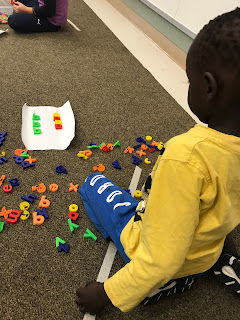I have mentioned UDL or Universal Design for Learning in several different conversations so I thought it might be good to share a few posts on this topic. So let's start with the basics. What in the world is UDL and why should we be talking about it?
Universal Design for Learning was recently defined and endorsed in the Every Student Succeeds Act of 2015 (ESSA); however it was defined a while ago...
Actually Universal Design for Learning was first discussed back in 1990. And it got its start from Universal Design which focused on architecture. We see something everyday that was universally designed...a curb cut. Why are there ramps or curb cut outs on streets, entryways, even here at the front of our school? Curb cuts certainly help if someone is in a wheelchair or using a walker, but they also help with strollers, wheeled suitcases, lawnmowers, carts, roller skates or roller blades, bikes. The list is endless. Thank goodness fifty or so years ago someone figured out that the way curbs were designed needed to be changed. They needed to be universally designed.
Fast forward to today and think about how this idea of universally designing education and learning can benefit every kind of learner. But exactly is UDL? Check out this short video clip (2 minutes) of Dr. Katie Novak, UDL guru, giving a simple explanation:
You can also check out another short video clip (4 minutes) of UDL at a glance on the CAST website, a great resource for all things UDL: http://www.cast.org/our-work/about-udl.html#.W6jMrJNKjOR
The last item about UDL I have for you to take a look at is this graphic. It shows the three main components of UDL. UDL is focused on these three networks of the brain. I will share more in future posts and discussions, but this is a little introduction into the amazing world of Universal Design for Learning.
I recently visited one of my favorite bookstores, Jeff Kiney's store called An Unlikely Story in Plainville. And of course I purchased a few new books. One new book is called The Book of Mistakes. This is a simple story that shows how mistakes can inspire us to create something different.
Another book I purchased is by one of my favorite local authors, Josh Funk. Josh is actually a software engineer by day and author by night. He has written several really great picture books...I have a bunch if you want to borrow any! The new one I just picked up is called Lost in the Library, and it's all about the lions who sit out front of the New York Public Library and an adventure in the library.
I have also been reading a really terrific professional development book about growing readers called From Striving to Thriving by Stephanie Harvey and Annie Ward. I have heard both of these women speak and I am always impressed with their dedication to young readers everywhere. I love many things in this book so far, but I especially love the focus on making sure "students remain students and don't become labels."Events this week:
Tuesday - Liz hosting several area principals in the library for a regional meeting, 7:30-9:00, Bus Meeting w/bus 47 @ 9:15 location TBD, Curriculum Night K-2 from 6:00-7:00, 3-5 from 7:00-8:00
Wednesday - Liz meeting w/PTA President @ 1:00
Thursday - Liz at Curriculum Meeting Central Office from 7:45-9:30, Liz meeting w/Commissioner of Education 10:00-11:30, 3rd grade Senior Pen Pals Program in the cafeteria @ 2:00
Friday - Picture Day! SPED team meeting @ 12:15 in the conference room, Library Committee Meeting @ 3:45
Great things I noticed last week:
- I popped into a kindergarten class and caught some learners enjoying a movement break and some dancing!
- And then when I popped into another kindergarten class, I had fun sorting letters with some students.
- Finally, I stopped in another kindergarten class and caught students illustrating some sentences all about kindergarten.
- It was good to come together on the half day on Thursday. I enjoyed listening in on discussions between paras and teachers as we worked through the DCAP and some student scenarios. It was also good to begin working on and discussing student safety and ALICE.
Check it out:
A quick, interesting read about emotional regulation for kids with ADHD:
https://www.edutopia.org/article/emotional-regulation-kids-adhd-lori-desautels
This is a great video clip of Sir Ken Robinson talking about changing education paradigms. You can watch the entire 11 minutes, but one of my favorite parts comes around 3:35 when he talks about the "ADHD epidemic."







































